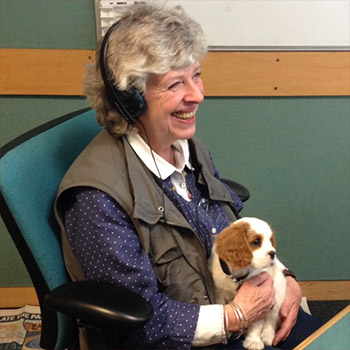Katie Patmore
I live with my husband and Perkins, our dog friend; and assist dogs and guardians in 1-1 sessions dealing with behavioural and training problems. And study! We have shared our lives with 2 children and various canine friends. I qualified as a social worker (C.Q.S.W.) in 1970, working in London and Norfolk. In Yorkshire, I set up my Dog Training School, offering classes and 1-1s, supported by mentors and having attended numerous courses, including learning to teach! I gained membership of the A.P.B.C. (behaviour) and the A.P.D.T. (training). Probably because of my social work background, my core interest developed into dog/human partnerships as I soon realised that what was coming through our doors were individual and nuanced relationships! I am a dog social worker!
Following receipt of a book (Becker 1962) from one of our sons, investigating what makes people act as they do, my interest in Anthropology became animated and I enrolled on an Anthropology degree (Lampeter). This was followed by an Anthrozoology Masters at Exeter that I was awarded in 2015. My dissertation concerned the Feasibility of Companion dogs in Public Places. I am now undertaking a PhD. Throughout my academic work, I attempt to merge 30+ years’ experience of helping dogs and their guardians live a more cohesive existence, with a scholarly approach enabling greater depth of understanding of the dog/human relationship.
My PhD project is called The Lived Experience of Companion Dogs and their Guardians. This concerns the lived world of the ordinary, everyday but unique and multi-faceted relationships between companion dogs and their guardians. Dogs and their people are ubiquitous, visible in almost all cultures and walks of life. Dogs impact both negatively and positively on the societies in which they exist: Some humans find dogs unacceptable and some embrace them, either as guardians or as by-standers.
We know a lot about the various components within attachments that these sentient beings form, although there is considerable diversity in all cultures about the ensuing relationships. There is considerable knowledge about the health benefits of living with dogs; there is burgeoning research in the area of dog cognition, behaviour and such like matters of canine beings. There is a huge amount of knowledge, albeit varied, concerning training and behaviour such as, for a small example, how to teach your dog to come back; what to do with reactive dogs or dogs who cannot be left. Living with these dogs is almost invariably centred on the dogs and their behaviours.
But what is it like, for dogs and humans to live together? In my research, through semi-structured interviews and family focus groups I will be investigating the phenomenological point of view, looking at how they experience their worlds. I will be looking at the significance and impact for dogs and their guardians, of the everyday existence of those who are experiencing problems, as well as those who are not.

